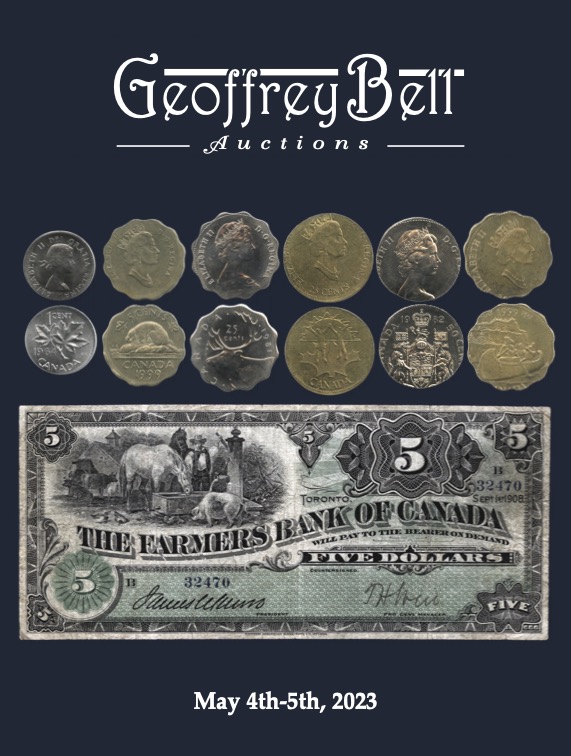
Here's the second of three summaries of articles by Joel Orosz on Bushnell's Compendium Catalog, originally published in our print journal, The Asylum. While The E-Sylum is free to all, only paid members of NBS receive The Asylum. To join, see
https://www.coinbooks.org/about/membership.html
.
This one discusses Daniel Groux.
-Editor
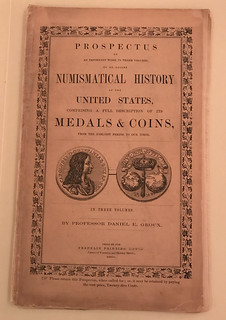 GROUX: FROM COURTIER TO KITCHEN HAND
GROUX: FROM COURTIER TO KITCHEN HAND
The article is about the life of Edouard Daniel Jacques Groux, who was born in 1807 in the Free and
Hanseatic City of Hamburg. He was well-educated and learned the trade of pastry chef from his father
after his family fell from favor with the Emperor. Groux inherited a cabinet of around five thousand
coins and medals from General Jan Pieter van Suchtelen and purchased a second cabinet of 2,800 coins
and medals in 1839. Groux attempted to monetize his collection in Marseille but failed. In 1841, the
American Consul in Marseille advised Groux to take his collection to the United States and sell it to the
government, but he entered a market with many eager sellers and only one unmotivated buyer.
GROUX: COMING TO AMERICA
The article talks about D.E. Groux, a numismatist who opened a museum in Boston in 1864 after his
failed museum in Marseilles. He tried to sell his collection to Harvard College but was declined. Later, he
attempted to sell his collection to the National Institute in Washington, D.C. but was rejected. He then
tried to sell some of his coins to Charles Francis Adams, a notable coin collector, and also asked for a
loan to redeem his pawned pieces. Adams made a series of loans, but Groux did not repay the loans by
the agreed time, leaving Adams in possession of many of his coins and medals.
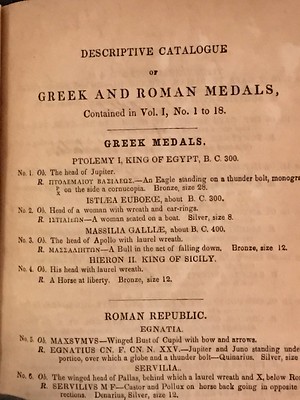 GROUX: EPHEMERAL HOPE
GROUX: EPHEMERAL HOPE
Daniel Groux, a collector of coins and medals, had a stroke of luck when he was paid to catalogue the
numismatic collection of the Maryland Historical Society in 1851. He also made a bid to sell his collection
to the US government, but despite receiving support from Senators Gwin and Soulé, he was
unsuccessful. Groux attempted to sell his collection to Barnum's American Museum and even tried to
sell it through a nationwide lottery, but both efforts were fruitless. Groux was then forced to turn to
public auction and sold his coins and medals in a sale in February 1856.
GROUX: MESS ON THE POTOMAC
Daniel Groux was a numismatist who was humiliated in court and failed to sell his collection. He moved
to Washington D.C., hoping to work as a curator at the Smithsonian, but was informed by the
institution's first Secretary that he would not be employed in any position. Groux was also a convicted
bigamist after his son pressed charges against him in Boston. He borrowed a large sum of money from
Phoebe Tayloe, of Washington, D.C., with his collection serving as collateral. He later convinced her to
attempt to recover coins he had lost to Charles Francis Adams a dozen years before. After failing to
recover them, Groux moved to Philadelphia and was entangled with the law there. He was jailed but
released on bail supplied by a gentleman of the city. This gentleman sought reimbursement by acquiring
the two parts of Groux's collection, which were pledged to secure the loan from Tayloe. Groux had
assured him that both collections were worth far more than the amount he had paid for them.
GROUX: JACKAL IN WINTER
The article discusses the life and career of Daniel Groux, a French adventurer who became known in the
numismatic world for his dubious sales schemes and the disappointing sales of his collections. After a
disastrous auction in 1861, Groux disappeared from the public eye until he wrote a letter to President
Lincoln in 1863, asking for employment. Groux died in 1871, and his remaining collection was sold in
1874 to pay off a debt owed to Phoebe Tayloe. Despite the hype surrounding the sale, the collection
was not particularly valuable, and the sale realized only a small amount of money. Overall, Groux's
career in numismatics was marked by failures and disappointment.
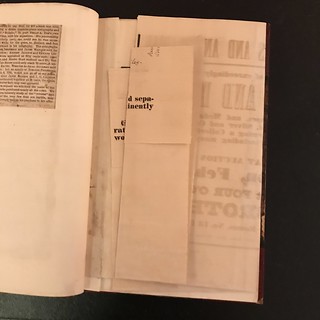
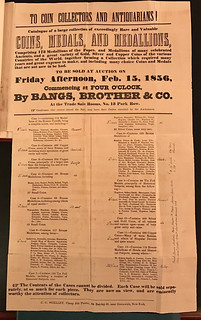
The Groux Broadside Sale, Folded and Open
GROUX: BROADSIDE SALE
In February 1856, Bangs, Brothers & Co held an auction of rare coins, medals and medallions in New
York City, which were described in a broadside format. Charles Ira Bushnell trimmed and attached the
top left half of this broadside to his Flandin's Catalogue book. Groux, the consignor, was in financial
difficulty and forced to sell some of his collection. The collection was packed into 12 glazed cases with
no numbered lots, and a note at the bottom of the broadside stated that the contents of the cases
couldn't be divided. Bushnell recorded the prices realized, and Bowers' American Numismatics Before
the Civil War provides two candidates for the purchaser of the Roman Pontiffs Medallions.
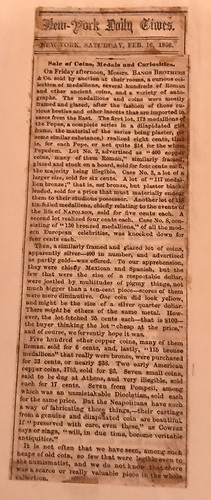 GROUX: BUSHNELL REVIEW
GROUX: BUSHNELL REVIEW
The article discusses a review by Charles Ira Bushnell of Groux's auction of ancient coins and medallions
that took place on February 16, 1856. Bushnell's review was published the day after the auction in the
New-York Daily Times. The article provides a detailed summary of Bushnell's criticisms of the auction,
including descriptions of the lots sold and their respective prices, as well as his overall assessment of the
collection. Bushnell was unsparing in his criticism, finding many of the pieces to be either illegible or
misdescribed.
GROUX: COLOPHON
The text discusses Daniel E. Groux's numismatic career and his sale of coins and medals in February
1856. Despite Americans undervaluing his collection, the sale raised $285.85 1/2, the highest he had ever
realized at auction. However, Groux was criticized for misleading descriptions, overvaluing pieces, and
even counterfeiting to execute his schemes. While he believed in the educational and monetary value of
his collection, his enthusiasm was not widely shared among collectors."
To read the earlier E-Sylum article, see:
BUSHNELL'S COMPENDIUM CATALOG, PART ONE
(https://www.coinbooks.org/v26/esylum_v26n17a07.html)
Wayne Homren, Editor
The Numismatic Bibliomania Society is a non-profit organization
promoting numismatic literature. See our web site at coinbooks.org.
To submit items for publication in The E-Sylum, write to the Editor
at this address: whomren@gmail.com
To subscribe go to: https://my.binhost.com/lists/listinfo/esylum
Copyright © 1998 - 2024 The Numismatic Bibliomania Society (NBS)
All Rights Reserved.
NBS Home Page
Contact the NBS webmaster
|







